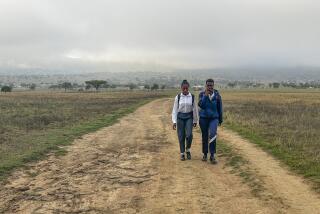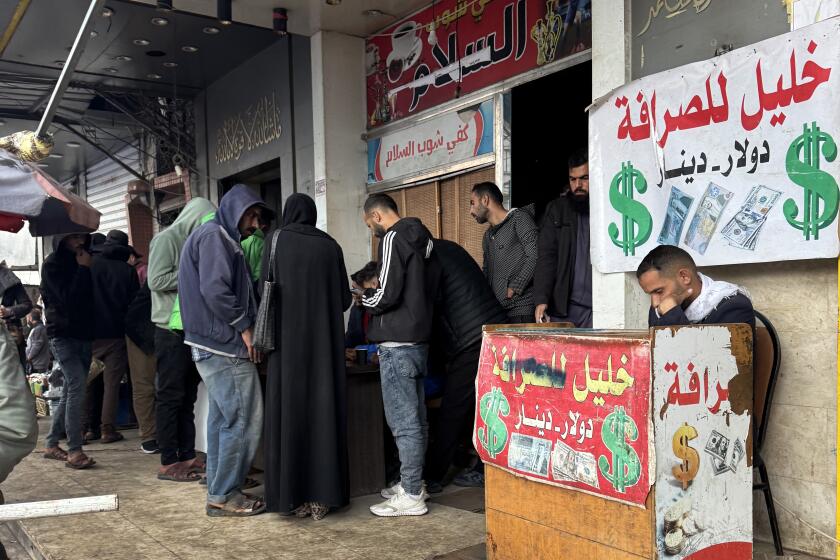South Africans rich and poor mourn Nelson Mandela, celebrate his life
JOHANNESBURG, South Africa -- From the glitzy shopping malls of upscale suburban Sandton, north of Johannesburg, to a trash-strewn corner in a crowded Soweto street, South Africans rich and poor, influential and jobless, black and white, united Friday to mourn the man they knew simply as “Tata,” or father.
After months of illness marked by fervent prayers that Nelson Mandela would miraculously recover, South Africans of all backgrounds and races, by the end, were reconciled to his release Thursday from the suffering of his sickbed.
As Mandela united the nation in great moments, such as the first democratic elections in 1994, a feeling of unity swept the nation Friday, bringing South Africa closer to elation than grief.
PHOTOS: Nelson Mandela through the years
“I felt sad, but also a little relieved, because he was struggling with this illness for some time. So he has peace,” said Annelice Govender, 30, an unemployed mother of two who learned of Mandela’s death when she heard the commotion in the streets of Soweto township as the news spread shortly before midnight Thursday.
Govender and hundreds of others, many of them unemployed young people, gathered outside his former home on Soweto’s Vilakazi Street. Outside Mandela’s house in the upscale Johannesburg suburb of Houghton, many of the mourners were on the other side of the rich-poor divide, which remains one of the country’s most entrenched social problems.
White South African women pulled up in huge SUVs, bringing their children and their domestic workers, clad in neat uniforms, white aprons and kerchiefs. Well-heeled members of the nation’s growing black middle class had their photos snapped with their cellphones in front of a mounting pile of flowers.
Hundreds of people placed bouquets, candles and South African flags outside the front wall. Drawings of Mandela were pinned to a fence.
As dignitaries pulled in to visit the family, police ramped up security and erected the fence to keep the crowds back.
Natalie Richards, 41, a white accountant, brought her three children, ages 3, 5 and 8, to see the tribute wall outside Mandela’s Houghton home. As she drove there, she tried to explain to them what Mandela meant to her and the country.
PHOTOS: The world reacts to Nelson Mandela’s death
“I wanted to give my kids a little bit of history, so one day when they look back, they will know they were here and they celebrated his life. I explained to them a bit of the history of South Africa, about black and white people being apart and how basically he brought everybody together and how he saved our beautiful country,” she said, her voice cracking with sadness.
“I feel very very blessed. I feel very proudly South African at the moment.”
A stone’s throw away, Andile Doemane, 33, who has been out of work since he finished school in 2002, had risen early in the poor black township of Windmill Park, south of Soweto, to come to the house.
“This man and his ability to listen to his enemies is what changed South Africa, otherwise South Africa would have been in chaos,” said Doemane, recalling Mandela’s preaching of racial reconciliation when he was released from 27 years in prison for fighting white minority rule.
“If he came from jail a bitter man, South Africa would have been chaos. I think that’s how he changed my life and the life of ordinary South Africans,” he said.
In the upscale Sandton City mall, shoppers scurried about with bulging bags and electronic goods piled high in carts.
One shopper, Guntu Shabalala, 43, a black owner of a small business, said that when he learned of Mandela’s death on the midnight news Thursday, he felt “strong,” because he had been expecting Mandela’s death at some point soon.
But when he woke up to a gray dawn, he said the entire city looked different.
“In the morning, when I saw different TV stations and newspapers, that’s when it started to sink in. That’s when I started to realize, when I went out in the morning, that we were waking up to a different day,” he said. “The traffic was different, the world was different. Life had changed, for everyone.”
ALSO:
Nelson Mandela wore the mantle of saint reluctantly
World mourns Nelson Mandela, South Africa’s ‘greatest son’
Nelson Mandela dies: Watch his first TV interview, prison release, more
Twitter: @latimesdixon
More to Read
Sign up for Essential California
The most important California stories and recommendations in your inbox every morning.
You may occasionally receive promotional content from the Los Angeles Times.










